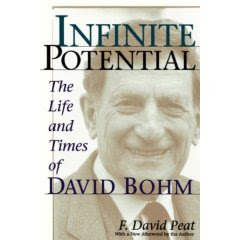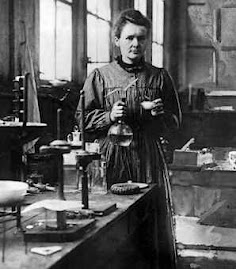
About a year ago I took Conjecture and Refutation by philosopher of science Karl Popper (1902-1994) out of the Brandeis library (also see). I am a great admirer of Popper's work. He was among the first philosophers of science to suggest that scientific theories are a product of human imagination/intuition. He felt that theories come first and determine which experiments are done. In contrast, the logical positivists, whose views were prominent at the time and still are to some extent, believed that the data comes first and determines theory. Since for Popper theory is based on conjecture, he argued that falsification of theory, or disproof, not verification, is the proper work of science.
Flipping through Conjecture and Refutation, I saw that a previous reader had left me a gift. It was an exceedingly unlikely bookmark for a treatise on the philosophy of science---even one that was a reasonably good read. Sporting the rather terrifying image of the bulked-up Intercontinental Wrestling Champion Ultimate Warrior in full warrior regalia shown above, it revealed the human being at its least cerebral and abstract.Brandeis is a pretty lofty place. Is it possible, I wondered, there is a Brandeis student who reads philosophy of science by day but is obsessed by steroid-taking human gladiators of the least subtle kind at night?
The idea of calling Karl Popper 'the ultimate warrior' came to seem less strange when I started dipping into Conjecture and Refutation. One chapter in particular brought home to me that Karl Popper could rightly be seen as a champion wrestler.(By the way,eventually I read the medium-size print on the back of the card and the mystery cleared up. It is one of a series of wrestling cards given out with video rentals at Coliseum Video Stores. What do I know!?)

In the chapter that especially captivated me, called "Back to the Presocratics," Popper considers the early Presocratic Tradition in part in light of the question of the role of observation in scientific endeavor. The following passages are from close to the beginning of the chapter. They might surprise those who associate Popper only with the idea that scientific theories have to be falsifiable (and empirically so).
The questions which the Presocratics tried to answer were primarily cosmological questions, but there were also questions of the theory of knowledge.... All science is cosmology, I believe, and for me the interest of philosophy, no less than of science, lies solely in its bold attempt to add to our knowledge of the world, and to the theory of our knowledge of the world.
...[I] is good to remember from time to time that our Western science—and there seems to be no other—did not start with collecting observations of oranges, but with bold theories about the world.
The Presocratics were concerned with such issues as. "'How do we know that the world is made of water?'" or, "'How do we know that the world is full of gods?’" or "'How can we know anything about the gods?'" In contrast Popper expresses disdain for the kind of questions that tended to interest his fellow philosophers, such as, "'How do I know that this is an orange?'" an influence he attributes to Francis Bacon.
We must not forget that the function of the Baconian myth is to explain why scientific statements are true, by pointing out that observation is the 'true source' of our scientific knowledge. Once we realize that all scientific statements are hypotheses, or guesses, or conjectures, and that the vast majority of these conjectures (including Bacon's own) have turned out to be false, the Baconian myth becomes irrelevant. For it is pointless to argue that the conjectures of science—those which have proved to be false as well as those which are still accepted—all start from observation.
Popper uses two early Presocratic theories about what keeps the earth in place to illustrate his views. Thales (620-547 BCE), who is sometimes called 'the first Greek philosopher' and sometimes 'the father of science,' understood the earth to be suspended in water like a ship. During an earthquake, he thought, the disturbance of the water it is suspended in makes the earth shutter. Popper points out that Thales' theory was not directly based on observation, although it seems to have been inspired by analogy to the experience of the earth shuttering during an earthquake as well seeing (or being on) a ship rolling with the waves. Yet experience could have played no role in the theory of the brilliant student of Thales Anaximander (610-546 BCE) because his views ran directly counter to observation. According to Anaximander:
'The earth... is held up by nothing, but remains stationary owing to the fact that it is equally distant from all other things. Its shape is... like that of a drum... .We walk on one of its flat surfaces, while the other is on the opposite side.' [Popper continues]The drum of course, is an observational analogy. But the idea of the earth's free suspension in space, and the explanation of its stability, and have no analogy what ever in the whole field of observable facts.
Popper speculates that Anaximander came to his theory by recognizing that his teacher's Thales view, would lead to infinite regress. If being supported by water explains the stability of the earth, what in turn accounts for the stability of the ocean, and in turn what accounts for the stability of what supports the ocean?
From this we see intuitively that the stability of the world cannot be secured by a system of supports or props. Instead Anaximander appeals to the internal or structural symmetry of the world, which ensures that there is no preferred direction in which a collapse can take place. He applies the principal that where there are no differences there can be no change. In this way he explains the stability of the earth by the equality of its distances from all things.
This view of the earth as freely suspended in space but immobilized because of its equidistant position, Popper considers one of the boldest and most important breakthroughs in the history of human ideas. It made possible Copernicus’s views; but as the initial step Anaximander’s idea was an even bolder conjecture. We see echoes of it even in Newton with his mysterious and invisible gravitational force. However Popper is not easily satisfied. He inquires why did Anaximander not take the next step and postulate that the earth was a symmetrical globe rather than a drum.
There can be little doubt: it was observational experience which taught him that the surface of the earth was, by and large, flat. Thus it was a speculative and critical argument, the abstract critical discussion of Thales' theory, which almost led him to the truth theory of the shape of the Earth; and it was observational experience which led him astray.
Popper anticipates the argument against his views.
But, a follower of Bacon may reply Anaximander was not a scientist. This is precisely why we speak of early Greek philosophy rather than of early Greek science. Philosophy is speculative: everyone knows this. And as everyone knows, science only begins when the speculative method is replaced by the observational method, and when deduction is replaced by induction.
He answers:
This reply, of course, amounts to the thesis that scientific theories should be defined by reference to their origin—their origin in observations, or in so-called 'inductive procedures'. Yet I believe that few, if any, physical theories would fall under this definition. And I do not see why the question of origin should be important in this connection. What is important about a theory is its explanatory power, and whether it stands up to criticism and to tests. The question of its origin, of how it is arrived at—whether by an 'inductive procedure', as some say, or by an act of intuition—may be extremely interesting... but it has little to do with it scientific status or character.
Popper reveals that it is of little concern to him whether the Presocratics are called scientists, pre-scientists or philosophers. But just as the origins of a theory in observation or intuition has nothing to do with whether it is a scientific theory, likewise whether a theory turns out to be true or false has nothing to do with whether it is a scientific theory. A number of theories that have turned out to be false have been more generative in our search to understand the universe than less bold theories which still stand. Theories supported by many observations, just like theories based only on intuition, often turn out to be wrong. When this happens, Popper asks, should the historian or philosopher of science then reclassify them as unscientific?

A final comment----
Alas I suspect that in spite of the above, some will see Popper not as 'the Ultimate Warrior' but only as Hulk Hogan the runner up!














9 comments:
Hi Lois,
You could think of Anaximander as prefiguring the medieval idea of Buridan's ass with equally succulent bales of hay on either side, he starved to death because he was unable to decide between them. Essentially he was acting (negatively) on the principle of sufficient reason, and that is also implicit in Newton's 2nd law(?) An object in motion remains in motion unless interrupted; likewise a stationary object - so the world just stays put unless there is something to move it. Is that a matter of observation? I think Popper's point is that our observations are theory laden or expectation laden, and I think that is true. Unfortunately that also applies to falsification.
By the way, I think you resemble Uncle Manny.
Hilde
p.s the ultimate warrior looks like the Si Stallone that used to be.
Hilde,
In fact there was a footnote in the chapter to this effect. Apparently Aristotle characterized Anaximander's 'ingenious but untrue' theory about the position of the earth to be like a man hungry and thirsty yet unable to move because he is equidistant from both food and drink--- what has become known as Buridan's ass.
The reference to Newton I believe fits perhaps better with the idea of gravity---effectively balanced forces---keeping the planets in their orbits. Newton by the way, had serious concern about the occult seeming nature of gravity---since it implied action at a distance.
I disagree with the idea that Popper's main concern was the theory-laddeness of observation. He really thought that bold and intuitive---not implicit theories--- guide science progress. He was strongly influenced by Einstein and his work.
I certainly agree that falsification is in the eye of the beholder.
Lois, according to your studies (what I appreciate) and your belief upon them (what I appreciate even more): do you think Sir Karl (P) accepted 'observation' which 'is' the foundation for science? What and HOW do we observe?
*
We 'get' certain phenomena only (maybe even only partially transmitted into our cognition that interprets them for 'us') - by those observational techniques which are (were?) available at the time of the observer for interpretation within the cognitive level THEN. Our instruments NOW (much more sophisticated than e.g. 2500, or even 50 (K.P.) years ago) are still primitive and built (designed) to work WITHIN the proper scientific cognitive inventory of their application. Comes new epistemic enrichment: newer instruments will be designed to 'measure' new concepts for enriching our science.
I am the naive hopeful who believes in further advancement, so today's level I do not consider the ultimate. Nor was Popper's more than 50 years ago. Science should be open to step into domains not (yet?) 'falsifiable' by the past cognitive levels. It takes new thinking with new concepts (words?) and we are at the very beginning of the 'future' - which starts now.
Old(er) geniuses were very wise, partially because they were not impaired(?) by 'too much' knowledge of the world, which continuously keeps accumulating ever since. To keep all that ancient 'wisdom': scientists dream up paradoxical solutions (eg. to combine the (discontinuous) atomic world into those hypothetical (continuous) fields, to fill the empty atoms with almost no 'matterly' in them by forces called 'matter' and calculate them as particles, etc. etc. - just to grab the figment of the 'atomic' world of matterly physics as an example.)
> He felt that theories come first and determine which experiments are
> done. In contrast, the logical positivists, whose views were prominent
> at the time and still are to some extent, believed that the data comes
> first and determines theory. Since for Popper theory is based on
> conjecture, he argued that falsification of theory, or disproof, not
> verification, is the proper work of science.
>
I hate to say this but I read his works and I don't remember this. In
fact, her is a what Plato.Stanford.edu says about
Popper and there is nothing in there to suggest this.
http://plato.stanford.edu/entries/popper/
> I hate to say this but I read his works and I don't
> remember this. In fact, her is a what Plato.Stanford.edu
> says about Popper and there is nothing in there to suggest
> this.
Philosophers of science usually see Popper as an opponent of Thomas
Kuhn and Paul Feyerabend, but their points of difference are often
exaggerated, and in the larger details they agree about a great deal.
All of them would agree that the "Baconian" model of science -- the
one blissfully assumed by almost all psychologists and almost everyone
on this list, as far as I can tell -- is a non-starter.
Popper was in his prime at the same time as the "logical positivists",
who said that much philosophy was literally meaningless. If there is
no way of telling whether a claim is true -- i.e. if there is no
conceivable evidence that could push you for it or against it -- then
the claim simply doesn't have a meaning.
The logical positivists were mostly concerned with drawing a line
between language that was genuinely "meaningful" and language that
wasn't, but Popper was more narrowly concerned with a particular sort
of human activity involving language -- what was genuinely
"scientific" and what wasn't. While their criterion was
"verifiability", his was "falsifiability".
The difference between them is as follows. A linguistic claim is
"unverifiable" if there is no conceivable evidence of any kind that
could push someone to accept it or reject it. A theory is
"unfalsifiable" if there is no conceivable experimental test or
observation that could force someone to reject it. This is a much
stricter criterion, intended to demarcate a much narrower area of
human activity and thought than language in general.
The cynicism that comes with age has taught me that, although falsifiability is a wonderful test of the meaningfulness of a theory, it is just a little too perfectly fitted to religious belief ; one can almost use it as a definition of religious belief/faith, i.e., theories which are not falsifiable, and I think of it more as a tailor-made tool in the atheist arsenal than a scientist's toolkit (I reiterate that I absolutely do not believe in God or gods). It is more a milestone in the history of religious disputation than of science, IMHO.
Bernie
I was so taken by the the passages I wrote about from Conjecture and Refutation because there Popper proposes relatively broad standards for what constitutes a scientific theory--much broader than I had realized before. In the passages I quote later on in the article it becomes clear that potential empirical falsification is not necessarily required according to his view here.
Instead the paramount issue is whether the theory can be subject to falsification either empirical or rational. This greatly surprised me and seemed noteworthy.
I called him the 'ultimate warrior' because he was taking on the issue about how humans could approach understanding the universe even when they could not make empirical tests of theory and when observation could easily lead astray. His message in these passages---that theories beyond what we can empirically test at the current time can be legitimate areas of scientific concern, if one can engage in critical discourse about them--- is also relevant today.
I feel his point is best captured by the title of the book: science is about conjecture and refutation. Indeed I feel we cannot ask more from science than this (except for technology of course--- which it supplies us with a plenty.) At the same time looking at science in terms of its falsifiability is really a gift as it can open our minds to the fact that there is much more to know than what can currently be known and no doubt even more than we can imagine. Taken this way--it is mind expanding.
Of course refutation is in the eye of the refuter. Popper does talk a lot about what it takes to falsify a theory elsewhere, as has been pointed out-- but his discussion seems rather removed from the nitty-gritty of actually doing science. But even he seems to know that it is really a judgment call.
My background is in biology. My sense is that it often takes more than it should to refute a current theory. What is science and what are fundable projects and sometimes even publishable observations are determined often by those with clout in a field. These are not infrequently people with a vested interest in a certain established point of view and perhaps often large egos. Therefore the 'search for truth' can get quite political. Therefor Popper's views are a healthy corrective perspective.
Our brains and our hands are too small to encompass much at all.
The dancing words and numbers are only clumsy representations of that which is.
Today I went to Mass and I played with some words and numbers. This pleased me.
It's how I celebrate life.
A physicist, an artist -- they both create representations of what they feel, what they see.
These representations will please others... or not. These representations may be further developed by others... or not.
There's a destination beyond which none of us can see.
The joy, the reason for life, is sharing the journey with others.
It is all art.
Good for people to know.
Post a Comment